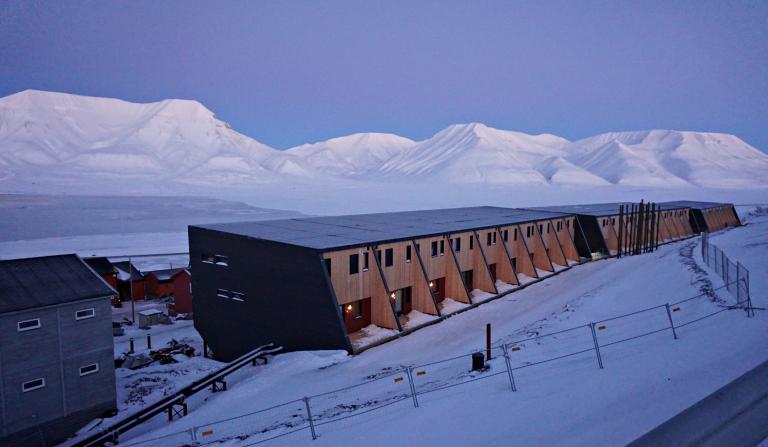Uproar Against Svalbard Housing Policy: - Soon, We Can Just Lock Up and Leave, Says Tourism Operator

Tightening the reigns in Svalbard housing policy is just one out of a series of initiatives interpreted as increased Norwegian assertation of presence and sovereignty in Svalbard. Photo: Samantha Saville
“Erna Solberg claims she wans to increase the share of Norwegians in Svalbard and facilitate more for Norwegians. In practice, she is doing the direct opposite", says Doreen Lampe of Spitzbergen Adventures.
The Norwegian governments wants a more efficient management of publicly owned housing in Longyearbyen, Svalbard, and is therefore looking to reduce the number of housing managers. The government is currently aiming to subject all state-owned houses to Statsbygg and Store Norske Boliger, the Ministry of Justice wrote in a statement earlier this month.
In practice, this means that the government wants to take over some of the housing from the University Center in Svalbard (UNiS) and the Longyearbyen Local Council, and to bring management of this housing onto public hands.
“The goals is to secure housing for public employees and contribute to good management of the housing available”, Minister of Justice and Preparedness Monika Mæland (Conservatives) argued in the press statement.
The housing situation for private companies and private persons in Longyearbyen has not been part of the revision of accommodation that has recently been conducted.
Marking presence
Following the government’s presenting its business strategy for Svalbard from October 2019, it has followed up with a ban on heavy-fuel oil and limitations placed on size for cruise vessels in the area. January brought the news that the government wants a certification scheme for guides operating in Svalbard, and now the tightening of housing policies.
It is easy to draw the conclusion that Norway uses these measures to mark its presence on Svalbard. However, some consider the initiatives more or less an unintended attempt at placing limitations on tourism and stagnating growth in tourism on Svalbard.
“Complete madness”
Doreen Lampe runs Spitzbergen Adventures in Longyearbyen. She refers to the new government housing policy as “complete madness”.
“What happens now, is that they are prioritizing public employees – again. We are struggling really hard, and right now I have a guide who has to leave an apartment without being able to find a new one.”
Lampe is very worried about the future.
“Soon, we can just lock up and leave”, she says.
Doreen Lampe has lived in Svalbard for 11 years and enjoys it although, she argues, it is wrong of the state to “interfere with everything”.
This week, Prime Minister Erna Solberg visited Svalbard.
“When it comes to housing policy, we are first of all making major investments when it comes to securing houses against avalanches and landslides. That makes it vital to have control over housing construction, in addition to having control over who lives here”, Erna Solberg said during her Svalbard tour this week.
Norwegians do not want to couch surf during a whole season.
“Erna Solberg claims she wants to strengthen the share of Norwegians in Svalbard and facilitate more for Norwegians, yet in practice she does the quite opposite”, Lampe argues. She refers to the Norwegian share of the Svalbard population having declined in recent years.
However, she does not believe that a tighter housing policy will help address that problem.
“We know that tourism is dominated by an international work force, though that may have something to do with Norwegians not wanting to couch surf during a whole season”, she argues.
The goal of the new housing policy is to secure housing for public employees and make sure the community does not grow beyond the current level. However, many argue that this new policy is to be interpreted as a signal that the Norwegian state wants to control housing in the world’s northernmost town.
And they fear that private businesses in Longyearbyen will struggle even more than they currently do to find housing for their staff.
Baffled
Målfrid Baik is the Regional Director of NHO Arctic [the local chapter of the Confederation of Business and Enterprise] is baffled that the statement only refers to and emphasizes the need for housing for public employees, and that it does not address private businesses, which are already struggling to find housing for their employees.
“I would argue that the government should at least take that into consideration in its policy”, she says.
The housing policy could and should have been used as a tool for the transition that businesses in Svalbard are facing, not the opposite.
Baik refers to how a transition of business from coalmining to more diverse businesses has been an unequivocally stated Svalbard policy.
“Such a transformation is hard to achieve with the current housing situation and we do not really see a solution in the foreseeable future. NHO Arktis argues that the housing policy could and should have been used as a tool for the transition businesses in Svalbard are facing, not the opposite.
Intervening in area plans
Local Councilor Arild Olsen (Labor) was not surprised by the press statement in and of itself, but rather about by how explicit it was.
“The starting point was just management of public housing. Now, however, it has become an intervention into the area plan. This may be considered official current policy”, he said to local paper Svalbardposten soon after.
The starting point was just management of public housing. Now, however, it has become an intervention into the area plan.
The area plans for Longyearbyen have a 10-12 year perspective and with that, a massive potential for development.
“The press statement from the Ministry of Justice makes us unable to exploit the potential described in the plan”, says Head of Planning and Development in Longyearbyen local council, Annlaug Kjelstad, to Svalbardposten.
This article was originally published in Norwegian and has been translated by HNN's Elisabeth Bergquist.


